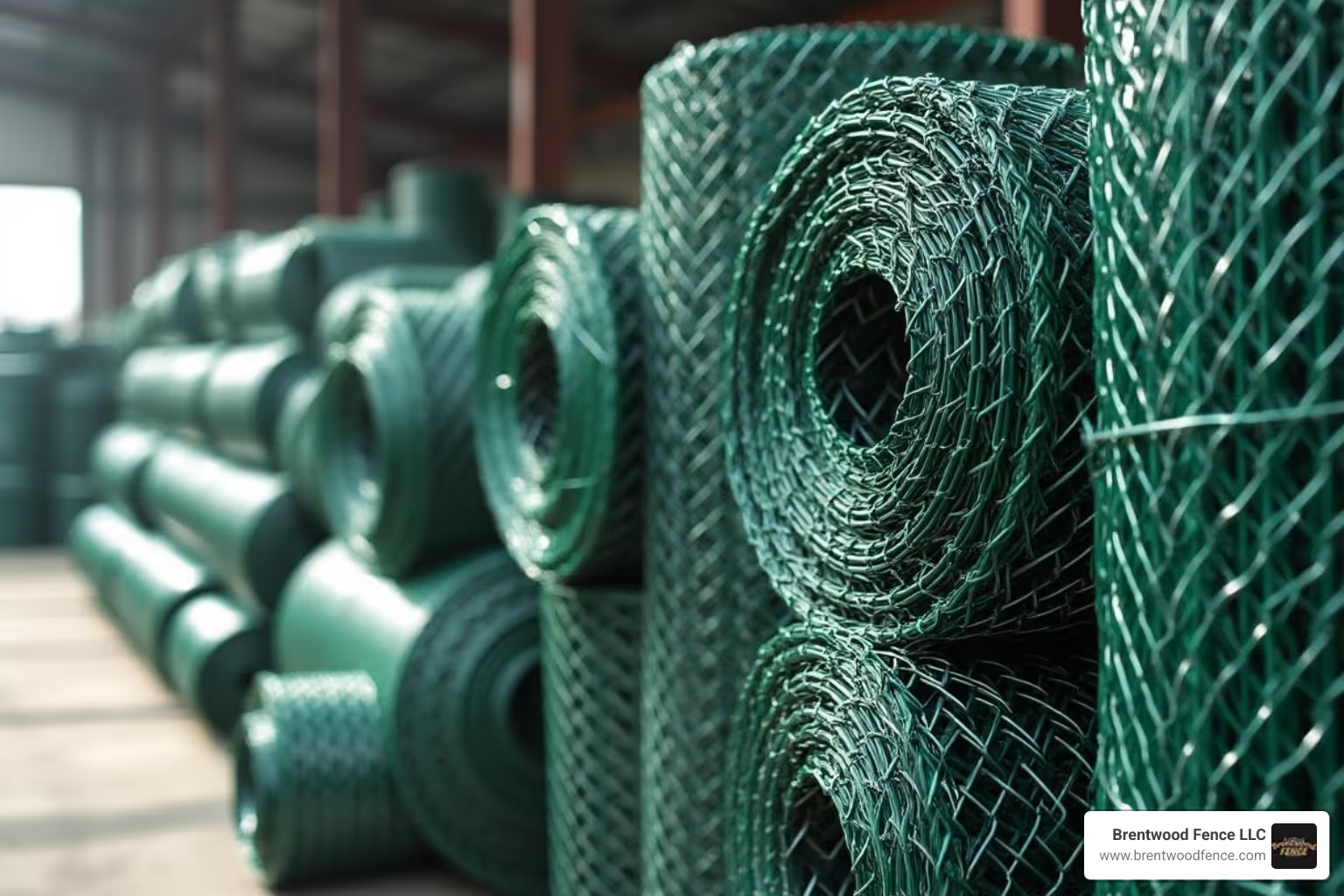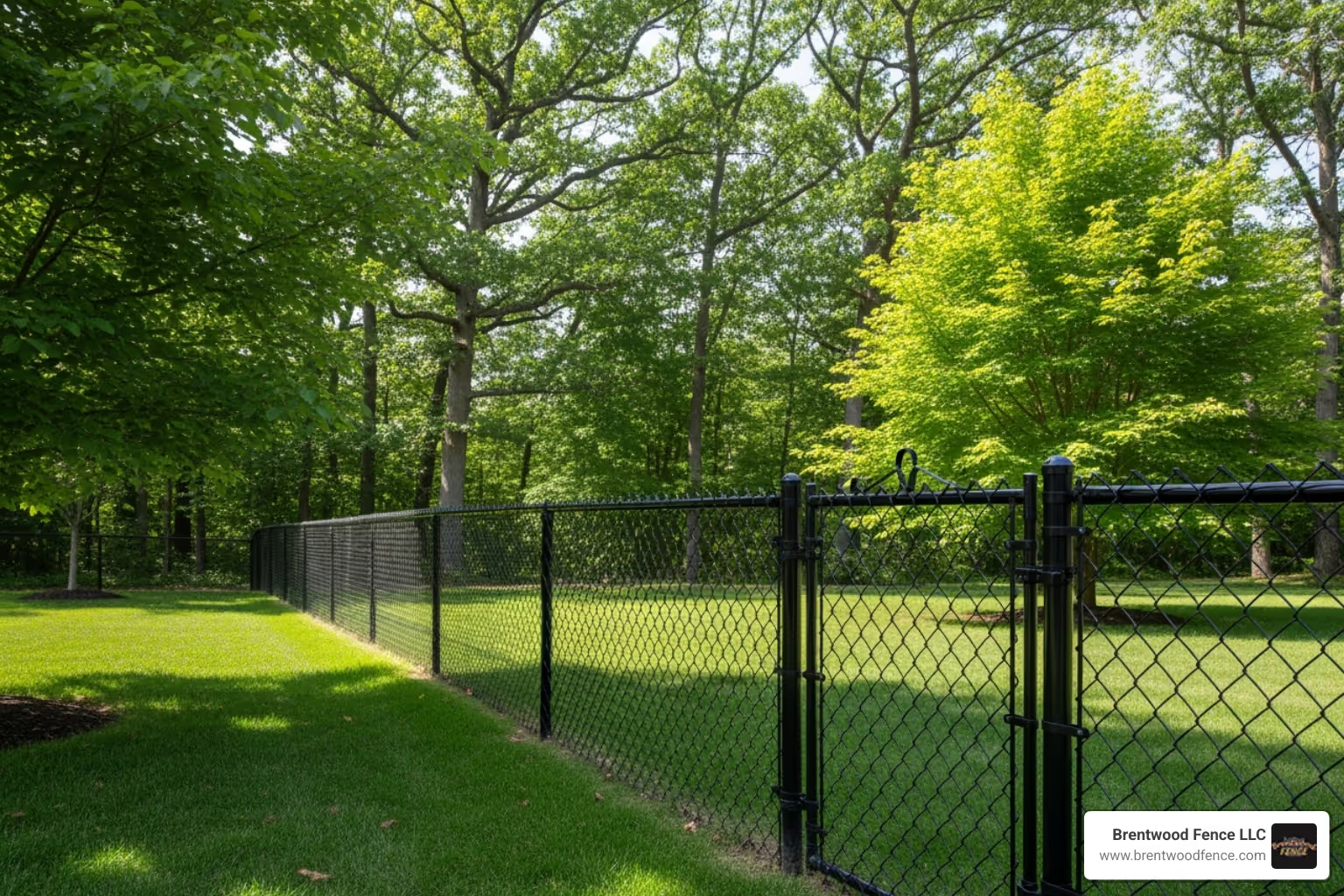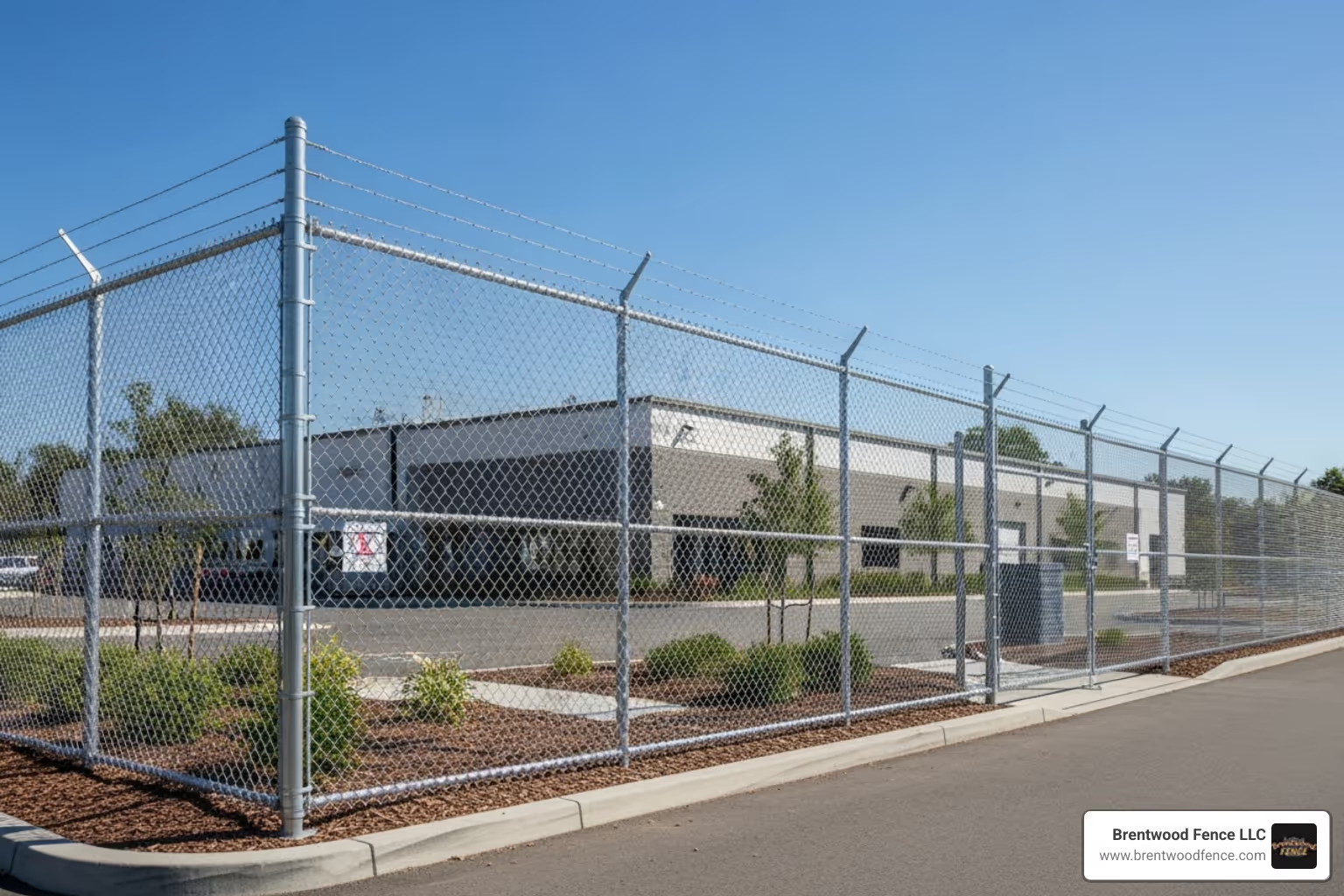Blog Content
1
Aug
2025

When picking a chain link fence, height is the first—and often easiest—decision. The job your fence must perform (decoration, containment, or security) naturally lines up with a handful of factory-made heights, each available off-the-shelf. Sticking with these standards keeps costs down and installation simple.
Always verify your local pool code.
Most suppliers stock rolls in 3-, 4-, 5-, 6-, 7-, 8-, 10-, and 12-foot fabric. For jobs like tennis or pickleball courts we frequently order custom 14- or 16-foot material—see our Sports Court Fencing Installation Services for examples.

In New England backyards the sweet spot is 4–6 ft. Four feet defines space without blocking views; six feet adds privacy and keeps energetic Labradors on the right side of the fence line. Front yards are usually limited to 2–4 ft. and that most pool codes specify at least 4 ft. with a self-closing gate.

Businesses typically start at 6 ft. for perimeter control and jump to 8 ft. when asset protection is critical. Sites that must truly keep people out—utilities, storage yards, or data centers—often specify 10–12 ft. fabric, sometimes topped with barbed wire. Brentwood Fence provides turnkey Commercial Fencing solutions for every level of risk.
When delay is just as important as deterrence, fences grow even taller and gain features like smaller mesh, heavier wire, buried fabric, and outward-angled razor wire. The Security Fencing Guidelines from the CLFMI outline best practices for these mission-critical systems.
A 10-foot fence made from light 11½-gauge wire is no match for bolt cutters, while a 4-foot fence woven from 9-gauge steel can shrug off decades of abuse. Height matters, but the components behind that height matter just as much.
Choosing a heavier gauge or tighter mesh increases material cost only marginally, yet dramatically improves cut- and climb-resistance. Our Chain Link Fence Materials guide breaks down the numbers.
Galvanized steel is the industry baseline. For coastal areas like Portsmouth NH, step up to:
Framework must match the fabric:
Specifying the right combination of gauge, mesh, coating, and framework ensures your fence still looks—and works—great long after the warranty ends.
A fence that violates code can turn a one-day job into a costly do-over. Before the first post goes in, confirm two sets of rules: municipal ordinances and, if applicable, your homeowners’ association.
HOAs can be stricter than the town. Common requirements include:
Skipping this step risks fines or removal; our team is happy to supply the documentation boards need.
Pool fences must meet state pool codes—usually 4 ft. high with self-closing, self-latching gates—to reduce drowning risk. Pet owners are similarly liable if a dog escapes and causes damage; a properly installed 6 ft. fence dramatically lowers that risk (see Massachusetts law on pet-related injuries).
In short, get the rules right first. Brentwood Fence routinely pulls permits and attends HOA meetings on behalf of our clients so your project starts—and finishes—smoothly.
It’s completely normal to have questions when you’re thinking about a new fence! We talk to homeowners and businesses every day about their fencing needs, and some questions about chain link fence heights come up more often than others. We’re here to help clear things up with straightforward answers.
If you have a furry friend who loves to explore, choosing the right chain link fence heights is super important for their safety and your peace of mind. For most large or athletic dogs, we generally recommend a 6-foot chain link fence.
Why 6 feet? Well, many big dogs can easily jump over a 4-foot fence without much effort. Even a 5-foot fence might not be enough for a determined jumper. A 6-foot height offers a much better deterrent, making it a real challenge for them to clear the top.
But remember, height isn't the only thing that matters! A wobbly fence is easier to push against or climb, no matter how tall it is. So, the fence's stability is crucial. Also, consider the mesh size; while standard mesh is usually fine, ensuring the fence is installed tightly and securely at the bottom can help stop digging attempts. It’s all about creating a secure, happy space for your canine companion.
You might be wondering if you can just make your existing fence a little taller. Good news! Yes, it is possible to extend the height of an existing chain link fence. We can usually do this by adding post extensions – that means sliding longer pipes over your current posts or welding new sections to them. Then, we attach a new section of chain link fabric to these extended posts, securing it to your original fence.
However, it’s not always as simple as it sounds. Before we extend any fence, we need to take a good look at a few things. First, can your existing posts and their foundations safely support the extra height and any added wind? A post meant for a 4-foot fence might not be strong enough for a 6-foot or 8-foot fence, especially when the wind picks up.
Second, we always need to check your local rules and HOA guidelines. Extending your fence might mean you need a new permit for the increased height. And finally, we'll talk about how the extended fence will look. While functional, sometimes an extension might not look as seamless or attractive as a brand-new, taller installation.
That's why we always recommend a professional come out and evaluate your specific fence. We’ll help you figure out if extending your current fence is the best, safest, and most cost-effective option for you.
It’s true, taller fences generally cost a bit more than shorter ones. But don't worry, chain link is still one of the most budget-friendly fencing options out there! The increase in cost for taller chain link fence heights comes down to a few key factors:
While the jump from a 4-foot residential fence to, say, an 8-foot commercial fence can be significant, we believe in full transparency. We always provide detailed estimates that clearly show the costs associated with different chain link fence heights and materials, so you'll know exactly what to expect.
Choosing the right chain link fence heights is a big decision. It’s about more than just picking a number. You need to balance what you want for security, how it looks, and what the local rules say. It's a mix of being practical and planning ahead. This makes sure your new fence truly works for you.
At Brentwood Fence LLC, we get it. Every yard is different, and so are its fence needs. We're here to help you sort through all the choices. Whether you're in Exeter NH, Manchester NH, or anywhere in Massachusetts and Maine, we’ve got you covered. From basic backyard fences to tough commercial ones, our team has years of experience. We love helping folks find just the right fit.
We'll help you determine the ideal height based on what you need your fence to do. Do you want to keep children and pets safe? Deter intruders? Or simply define a property boundary? We'll make sure it's just right. We also know that following the rules can be tricky! That's why we’re well-versed in the varied zoning laws, building codes, and HOA guidelines across New Hampshire, Massachusetts, and Maine. We’ll ensure your fence is not only perfectly suited to your needs but also fully compliant with all local requirements, assisting with permits if necessary. And of course, we’ll guide you through picking the right materials. This includes the best wire gauge, mesh size, and coating (like galvanized or vinyl-coated) to make sure your fence is super strong and lasts a long, long time.
Then comes the expert fence installation. Our professional team handles everything with precision and care. We ensure proper post setting, fabric tensioning, and gate alignment. You’ll get a fence that looks great and stays strong for years.
Choosing professional installation means you’re getting real value that lasts. We're proud of our great work and happy customers. Your fence will bring you security, work just right, and boost your home's curb appeal for many years.
Ready to find the perfect chain link fence heights for your place? Give us a shout! We’re here to give you expert advice and make the whole process easy.
Get a professional fence installation estimate for your project
Copyright 2022 Brentwood Fence | All Rights Reserved | Sitemap | Website by Plumb Development a Digital Marketing Agency